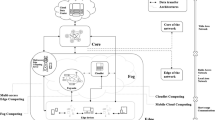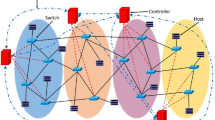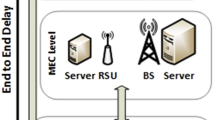Abstract
The explosive growth of mobile data traffic has raised big penetration to cellular network. Fortunately, offloading part of traffic through Delay Tolerant Network (DTN) would be a promising option to relieve load pressure. However, the existing routing strategies designed for DTNs are inappropriate in offloading scenario, where i) large data item would take on the dominance of mobile traffic, ii) centralized control can be exploited with merge between DTN and cellular network. To improve the routing performance of large data transmission, we propose a novel optimization model by creating two-tier solution space based on fragmentation, maximizing the probability that the requested data item is successfully delivered before expiration, taking limited buffer space as constraint metric. Moreover, a specific routing scheme is instantiated from our model, which is supported by uniform fragmentation and fine-grained path selection. Extensive trace-driven simulations show that our scheme is more appropriate for offloading case with outstanding performance in terms of replication overhead and acceptable routing capability.
创新点
通过容断容迟网络分流数据,已成为缓解蜂窝系统流量负载的前瞻性举措。然而,针对容断容迟网络的路由策略不适用于具有以下特征的分流场景:1)大容量文件在移动流量中的占比较高;2)蜂窝网络引入了集中化控制的优势。因此,本文创新性地以节点缓存空间的有限性为约束条件,以最大化数据成功递交率为优化目标,基于分片传输策略,提出了具有双层解空间的优化模型。此外,利用均匀分片策略及细粒度的路径选择机制,实现了基于上述优化模型的路由策略,在大幅度降低网络副本开销的情况下保证了路由传输性能。
Similar content being viewed by others
References
Cisco Visual Networking Index. Global Mobile Data Traffic Forecast Update, 2013–2018. White Paper, 2014
Zhuo X, Gao W, Cao G, et al. An incentive framework for cellular traffic offloading. IEEE Trans Mobile Comput, 2014, 13: 541–555
Li Y, Qian M, Jin D, et al. Multiple mobile data offloading through disruption tolerant networks. IEEE Trans Mobile Comput, 2013, 13: 1579–1596
Izumikawa H, Katto J. RoCNet: spatial mobile data offload with user-behavior prediction through delay tolerant networks. In: IEEE Wireless Communications & Networking Conference, Shanghai, 2013. 2196–2201
Dai Y, Cao G, Gao W, et al. Contact duration aware data replication in delay tolerant networks. In: 19th IEEE International Conference on Network Protocols, Vancouver, 2011, 1416: 236–245
Li Z, Liu Y, Zhu H, et al. Coff: contact duration aware cellular traffic offloading over delay tolerant networks. IEEE Trans Vehicular Tech, 2014, 64: 5257–5268
Zhang X, Neglia G, Kurose J, et al. Benefits of network coding for unicast application in disruption-tolerant networks. IEEE/ACM Trans Netw, 2013, 21: 1407–1420
Pitkanen M, Keränen A, Ott J. Message fragmentation in opportunistic DTNs. In: International Symposium on World of Wireless, Mobile and Multimedia Networks, Newport Beach, 2008. 1–7
Ding L, Wu P, Wang H, et al. Lifetime maximization routing with network coding in wireless multihop networks. Sci China Inf Sci, 2013, 56: 022303
Ma Y, Jamalipour A. A cooperative cache-based content delivery framework for intermittently connected mobile ad hoc networks. IEEE Trans Wirel Commun, 2010, 9: 366–373
Masiero R, Neglia G. Distributed subgradient methods for delay tolerant networks. In: Proceedings of IEEE INFOCNM, Shanghai, 2011. 261–265
Picu A, Spyropoulos T. DTN-meteo: forecasting the performance of DTN protocols under heterogeneous mobility. IEEE/ACM Trans Netw, 2014, 23: 587–602
Lindgren A, Doria A, Schelén O. Probabilistic routing in intermittently connected networks. Sigmobile Mobile Comput Commun Rev, 2004, 7: 19–20
Balasubramanian A, Levine B N, Venkataramani A. Replication routing in DTNs: a resource allocation approach. IEEE/ACM Trans Netw, 2010, 18: 596–609
Elwhishi A, Ho P, Naik K, et al. Self-adaptive contention aware routing protocol for intermittently connected mobile networks. IEEE Trans Parall Distr Syst, 2013, 24: 1422–1435
Spyropoulos T, Psounis K, Raghavendra C S. Efficient routing in intermittently connected mobile networks: the single-copy case. IEEE/ACM Trans Netw, 2008, 16: 63–76
Spyropoulos T. Efficient routing in intermittently connected mobile networks: the multiple-copy case. IEEE/ACM Trans Netw, 2008, 16: 77–90
Abdelkader T, Naik K, Nayak A, et al. SGBR: a routing protocol for delay tolerant networks using social grouping. IEEE Trans Parall Distr Syst, 2013, 24: 2472–2481
Chen K, Shen H. Smart: utilizing distributed social map for lightweight routing in delay-tolerant networks. IEEE/ACM Trans Netw, 2014, 22: 1545–1558
Gao W, Li Q, Zhao B, et al. Social-aware multicast in disruption-tolerant networks. IEEE/ACM Trans Netw, 2012, 20: 1553–1566
Daly E, Haahr M. Social network analysis for information flow in disconnected delay-tolerant manets. IEEE Trans Mobile Comput, 2009, 8: 606–621
Hui P, Crowcroft J, Yoneki E. BUBBLE Rap: social-based forwarding in delay-tolerant networks. IEEE Trans Mobile Comput, 2011, 10: 1576–1589
Gao W, Cao G, Porta T L, et al. On exploiting transient social contact patterns for data forwarding in delay-tolerant networks. IEEE Trans Mobile Comput, 2013, 12: 151–165
Karagiannis T, Boudec J L, Vojnovi´c M. Power law and exponential decay of intercontact times between mobile devices. IEEE Trans Mobile Comput, 2010, 9: 1377–1390
Gao W, Cao G, Iyengar A, et al. Cooperative caching for efficient data access in disruption tolerant networks. IEEE Trans Mobile Comput, 2013, 13: 611–625
Shaked M, Shanthikumar J. Stochastic Orders and Their Applications. New York: Academic Press, 1994
Tie X, Venkataramani A, Balasubramanian A. R3: robust replication routing in wireless networks with diverse connectivity characteristics. In: Proceedings of the 17th Annual International Conference on Mobile Computing and Networking. New York: ACM, 2011. 181–192
Chaintreau A, Hui P, Crowcroft J, et al. Impact of human mobility on opportunistic forwarding algorithms. IEEE Trans Mobile Comput, 2007, 6: 606–620
Author information
Authors and Affiliations
Corresponding author
Electronic supplementary material
Rights and permissions
About this article
Cite this article
Bao, X., Zhang, Y., Guo, D. et al. An optimization model for fragmentation-based routing in delay tolerant networks. Sci. China Inf. Sci. 59, 1–16 (2016). https://doi.org/10.1007/s11432-015-5501-9
Received:
Accepted:
Published:
Issue Date:
DOI: https://doi.org/10.1007/s11432-015-5501-9




